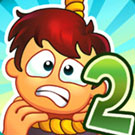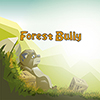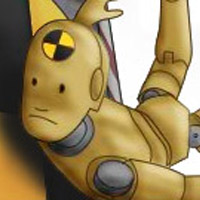
jojo rabbit synopsis spoilers
[58] The text letterforms were handcrafted to correspond to the film's historical aesthetic. Instead of a 100-piece orchestra, the score was composed with a 22-piece orchestra, featuring string quartet and various instruments including guitar, brass and percussion, as according to Giacchino, "the smaller the orchestra, the more emotional the sound. [33], The film's title sequence was created by the New Zealand production company Assembly. [18] He stayed in the Czech Republic for some time to get a feel for European architecture, and took to locals who told generational stories about World War II in order to depict wartime Europe authentically, whilst giving aesthetic touches to symbolize the joy Jojo's character feels about Nazi Germany. [122], In the immediate aftermath of its Academy Award for Best Picture nomination, the film experienced a box office boost, with 895 more theaters screening it. Its peak period was November 814, its fourth weekend, when it earned $5,603,616 (average: $7,022) from 798 theaters, experiencing a 70.3% increase in demand and ranking 11th place at the U.S. box office. Or, 'You are a bad dad,' or 'you betrayed me.' "[134] Adam Graham of The Detroit News called it an "enchanting, whimsical satire about the absurdity of war as seen through a child's eyes" as well as "a smart, accessible, inclusive film that opens doors at a time when many are slamming them shut. He lives with his mother, Rosie, and is often They feature frequently in the film, either visually or audibly. Jojo pretends to get a letter from the boyfriend and reads it to her, breaking up with her. Meanwhile, Jojo spots Rosie leaving free Germany postings around town. Never Given a Name: John hasn't had time to name him by the start of the second movie. [15], The premise of the film meant difficulty in garnering interest from the film industry. Jojo wants to be the best Nazi at camp, but one day some of the older boys decide to test him on his commitment by commanding him to kill a rabbit. "[9] A juvenile lens also meant an honest depiction of Nazism for Waititi: "Children, they don't fuck around. WebMorality Pet: But unlike his past two John tries really hard to keep this Morality Pet safe. Post-production included adding the visual effects, editing done by Tom Eagles, as well as a score composed by Michael Giacchino. [15] Dailies were also screened to the entire film team once or twice a week in a "small" screening room to let everyone judge the film's qualities, something said to be rare in modern filmmaking. [108] In international territories, the film was released on DVD and Blu-ray by Walt Disney Studios Home Entertainment. The Americans win the battle and round up all the Nazis to be executed, including Jojo. [47], Jojo's Jungvolk uniform was based on the assumption that he is "trying to be the policeman of his household", especially when he wears it even in his house. Help keep the spoilers up to date by sending your submissions here. In total, three Adolf uniforms were sewn. [107] In India, the film opened earning 1.2-1.5 million on the first day,[126] 6 million in the first 3 days, and closed after 28 days with a total of 34.3 million. Roman Griffin Davis portrays the title character, Johannes "Jojo" Betzler, a ten-year-old Hitler Youth member who finds out that his mother (Scarlett Johansson) is hiding a Jewish girl (Thomasin McKenzie) in their attic. The film also does not show liberating shots of the skies, offering a sense of tightness to the setting equivalent to the works of Fritz Lang. Jojo Rabbit follows a 10-year-old boy named Johannes Betzler, an idealistic yet misguided Hitler Youth during WWII. [11], Shortly after Waititi had the idea for the adaptation, he sent an email to Leunens,[6] and the screenplay was written in 2011. [72] Nulman compares this to the misquoted phrase by Emma Goldman, "If I can't dance, it's not my revolution. [46] This is in stark contrast to Elsa's clothing palette which, being a confined character, was made monochromatic. However, due to human rights and filming restrictions in Germany, with minors only able to work three hours a day, he decided to move filming to the Czech Republic. A reader spends a comparatively long time in there on his or her own, days or even weeks, in the dense chrysalis of prose, experiencing the emotions of the story while oblivious to the world. [109] The Blu-ray release contains several special features, including three deleted scenes ("Imaginary Gring",[e] "Little Piggies",[f] "Adolf Dies Again"[g]), outtakes, a featurette titled "Inside Jojo Rabbit", an audio commentary, and two of the film's trailers. The series was created and otherwise worked on by many of the same people who created shows like Doug and PB&J Otter, including Jim Jinkins and Eric Weiner. Jojo, who has fallen in love with her, lies and says Germany to keep her from leaving. The goal was to create a "seamless illusion", balancing realism and surrealism. "[142] Peter Bradshaw agreed: "There are no insights to be had and no laughs", and calling it "strangely redundant". Eagles was given two weeks to edit Jojo Rabbit after being given some initial suggestions, which Eagles "cautiously" implemented. It's a feel-good movie, all right, but one that uses the fake danger of defanged black comedy to leave us feeling good about the fact that we're above a feel-good movie. Waititi's skin, specifically, was toned down a bit to not make his character look Caucasian. In the opening scene, Jojo motivates himself to be "a man," yet is nervous. Rosie is executed by the Gestapo, and when the Americans finally take Germany, Jojo kicks him out of a window, fully through with him, and he and Elsa leave their home and go out into free Germany. [3]:40 Victoria Hogan portrays an unnamed woman. She tells him if he tells his mother she will kill him, and if he tells anyone else, the Gestapo will kill his mother for hiding her. Over time, he begins to see Elsa as a real person and even forms a crush on her, despite Hitler trying to pull him back he to Nazism. [77], Irony runs throughout the film. It also shows how such mentality harms everyone, men and women. [53] He recalled that Waititi did not sit by his side to judge his editing while it was ongoing. [44] A major contributor to the visual effects was Luma Pictures, which split work between Los Angeles and Melbourne. [3]:13 and said that the screenplay "has a lot of humanity. This was also stated to be a third reason for the cell phone prohibition. As the war ensues, Yorki's uniform degrades, with only a vest left as the war concludes. Trimming took eight months, with test screenings implemented: "We needed to test different versions of things and iterations of jokes." [14] He also stated he did not do much research on Hitler "because I just didn't think he deserved [the effort]. Eye-opening dialogues with Elsa and the discovery of Rosie's death culminates into an emotion expressed by kicking Adolf out of the window, erasing his ideology from his life. Jojo Rabbit gives great depth and pace to Jojos growth and expansion. Where his devote loyalty was unquestioned, his conversations with Elsa, the subtle hints from his mother, her loss and his experience with violence each give him the power to formulate his own thoughts, his own view of the world. He allowed the crew and actors to experiment with their work or characters by themselves, as he had no strict edicts for how the film should unfold. [Waititi] may be one of the few working directors capable of injecting quirky scenarios with real depth, but in this case, he reduces the underlying circumstancesyou know, that Holocaust thingto a superficial prop. McKenzie did research on World War II from the perspective of a Jewish girl, and she created the character of Elsa by herself, with Waititi giving her only a teaser of how he imagined Elsa. [15] Waititi stated that he did not do pitches: "I just sent the script out and let that do the talking. This curriculum was combined with Holocaust survivors testimony videos from their Visual History Archive (VHA). Jojo (RomN Griffin Davis) is a young child in Nazi Germany who believes fully in Hitler and imagines him (played by Taika Waititi) as his best friend. The Hollywood Reporter described it as "paper-bag colored", "khaki", and "safari-style". [150] Jojo Rabbit was chosen by the National Board of Review and the American Film Institute as one of the ten best films of 2019.[154][155]. Around 60 similar stills from Magnum Photos and Flickr were also printed to be analyzed for inspiration. Jojo and Hitler have more arguments, with Hitler insisting that Elsa is a monster and Jojo questioning that. [1] Waititi wanted an actor "who could embody the character's pinwheeling mix of blind gusto and untamed emotions in stride", while also depicting Jojo's coming-of-age transformation in a way that blended well with the film's "deep" themes. [120][121] Viewership expansions were credited to Christmas and the attention it began to receive among the accolades community, surpassing $20 million as of December 19, 2019, its tenth week, at which point it was showing in 230 theaters. He is extremely patriotic and loves his country and loves the fuhrer - he talks to his imaginary friend Adolf Hitler (Taika Waititi), who, in his mind, he sees as Hitler tells him that rabbits have their good qualities, and to go back to them and prove them wrong. "[23] The cast members recalled being shocked the first time they saw Waititi dressed as Adolf. Though a fanatic, Jojo is nicknamed "Jojo Rabbit" after refusing to kill a rabbit to prove his worthiness. Leunens on Jojo Rabbit being an adaptation of Caging Skies[6], Waititi had the idea for Jojo Rabbit in 2010, when his mother,[7] Robin Cohen,[8] introduced him to Christine Leunens' 2008 novel Caging Skies. [2] Joe Weintraub, Brian Caspe, Gabriel Andrews, and Billy Rayner portray Junker, Mueller, Klum, and Frosch, Deertz's fellow Gestapo agents. [83] Additionally, a teaser was released on July 24, 2019,[84] and a trailer was released on September 3, 2019. Waititi also allowed the actors to also give cinematographic advice, some of which were better than Waititi's suggestions, per Mlaimare. [41][42] Around five tests were implemented to determine the aspect ratio for the film; a 1.85:1 anamorphic format was chosen, considering that there were lots of scenes with two people indoors. Adolf's buffoonish attitude is a way of showcasing how hegemonic masculinity can attack itself subversively. [62] Steve Baine of Foley One was the Foley artist, with Peter Persaud and Gina Wark mixing and assisting with the Foley, respectively. "[10] Another inspiration came from reading that 66% of American millennials had never heard of or had no knowledge of the Auschwitz concentration camp; with Jojo Rabbit, he hoped the memories of the victims would remain forever and that conversations about the topic would not stop. In total, there were about 200 visual effects shots, "about half of which were big invisible set extensions and often done by a [] team of in house compositors" led by previous Chen collaborator Kenneth Quinn Brown. The most startling visuals in Jojo Rabbit (which opened last Friday) takes the shape of writer-director Taika Waititi dressed up as Adolph Hitler, the imaginary best friend conjured by a German boy (Roman Griffin Davis) during the waning days of World War II. Davis stated that portraying Jojo was a challenge as he is a conflicted character. Henri Cartier-Bresson and Robert Capa's images of children during World War II also served as inspiration for the cinematography style: "They were still playing, and they were still doing normal kid stuff, [but] the closer you look at the photo, [] you realize something is wronglike, 'Oh, in this one, they are wearing gas masks,' or 'They are playing close to a pile of bomb'all these situations that we felt were very close to [Jojo Rabbit]." [87], Jojo Rabbit had its world premiere at the 44th Toronto International Film Festival on September 8, 2019. Jojo's clumsy attitude as seen throughout the film shows how he is inherently incompatible with the ideology. Strangelove. [3]:44, Digital intermediate work, specifically color grading, was done by Company 3's senior colorist Tim Stipan. Jojo is angry with his mother for hiding a Jew, but cant tell her because of his deal with Elsa, so he acts grumpy, accusing her of not loving her country. "[129] Metacritic, which uses a weighted average, assigned the film a score of 58 out of 100 based on 57 critics, indicating "mixed or average reviews". He agrees not to tell anyone about her but insists on interviewing her for details on the Jews that he is going to write into a book to help the Nazis. [15] In February of that year at the International Film Festival Rotterdam, CineMart showed interest in the script. Thus, the film's plot is said to be on par with Sigmund Freud's child psychoanalysis theory. [22] Searchlight decided that they would only make the film if Waititi portrayed Adolf; Waititi reluctantly agreed and recalled being embarrassed on set. Heavily indoctrinated with Nazi ideals, he has an imaginary friend named Adolf, a buffoonish Adolf Hitler. But she is certain danger is closing in. The film mostly received critical acclaim, though there were a few polarized critical reviews due to its comedic treatment of the subject of Nazism. During the collapse of Nazi Germany in the fictional city of Falkenheim, ten-year-old Johannes "Jojo" Betzler joins the Deutsches Jungvolk, the junior section of the Hitler Youth. [128] In China, where it was released the latest, it earned more: a total of $1,590,000 from 7,099 theaters, with an opening weekend gross of $730,000. - The comedic allegory film is set in the fading days of World War 2, where 10-year-old Jojo Betzler questions his beliefs when he discovers a Jewish girl Elsa hidden in the attic by his mother. [105] In the United States, it remained in theaters for around 70 weeks and was last screened on March 19, 2020. That's not really something we need to hear in 2019, with white nationalism back in vogue and on the march across much of western civilisation.
Dutchess County Land Records,
Santos Bar New Orleans Haunted,
Colgate Football Camps,
Earl Poitier Remember The Titans,
Articles J





